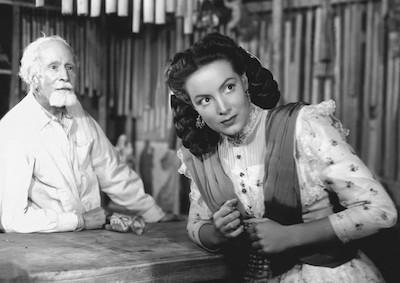Access every screening in the UCLA Festival of Preservation with a $50 pass.
Enamorada (Mexico, 1946)
Preservation funding provided by The Film Foundation's World Cinema Project and the Material World Charitable Foundation.
Enamorada, which translates as “A Woman in Love,” is a loose adaptation of The Taming of the Shrew. Macho man and Mexican revolutionary General Reyes (Armendáriz) conquers the pueblo of Cholula, then falls hopelessly in love with Beatriz Peñafiel, the daughter of the richest and most conservative man in town. Embodied by María Félix, she knocks him off his feet with a slap after he whistles at her, then literally blows him off his horse with a bomb. Hollywood called it “meeting cute.” The “taming” here consists of the General getting down on his knees repeatedly and asking her for forgiveness for all the atrocities he has committed. She does fall eventually, signaled by an extreme close-up of Beatriz awakening to love, as Reyes serenades her under her window. The final scene pays homage to Josef von Sternberg's Morocco (1930), but this is one of the masterpieces of Mexican cinema.—Jan-Christopher Horak
DCP, b/w, in Spanish with English subtitles, 99 min. Production: Panamerican Films. Producer: Benito Alazraki. Directed by Emilio Fernández. Screenwriter: Benito Alazraki, Emilio Fernández, Íñigo de Martino. Cinematographer: Gabriel Figueroa. Editor: Gloria Schoemann. With: María Félix, Pedro Armendáriz, Fernando Fernández, José Morcillo.
Restored by UCLA Film & Television Archive and The Film Foundation’s World Cinema Project in collaboration with Fundacion Televisa AC and Filmoteca de la UNAM. Laboratory services by Roundabout Entertainment, Audio Mechanics, DJ Audio, Inc., The PHI-Stoa Lab, Fotokem, Titrafilm Paris, Terminal Films S.A. De C.V., Simon Daniel Sound, L’Immagine Ritrovata. English translation by Roberto Esteban Green Quintana. Special thanks to Mauricio Maillé Iturbe, Fundación Televisa A.C.; and Fernando Osorio Alarcón and Albino Álvarez Gómez, Filmoteca de la UNAM.






 Mobile Navigation
Mobile Navigation

